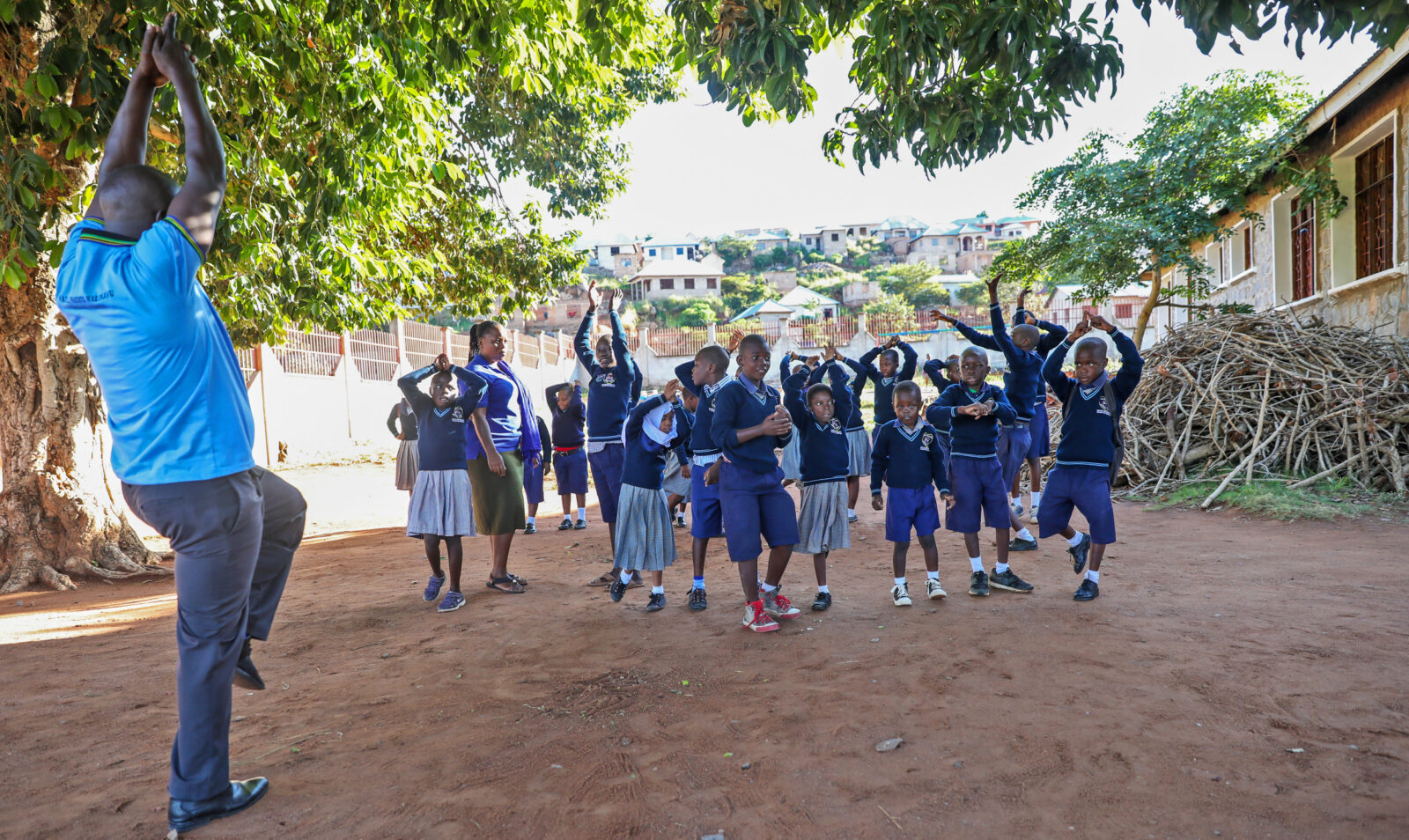
Children at Huruma School in Mwanza doing their morning exercises. Photo by Jerry Fleury.
So what exactly are we doing here, anyway? I ask myself that question almost every day. The first several months in Tanzania were exciting and exhausting and wonderful (and at times very strange), as we adapted to a very different culture and a very different way of living.
During those three months, the kids adjusted to their new school, Kyle and I adjusted to a routine of Kiswahili classes in the mornings — and figuring out “how to live in Tanzania” during the afternoons. We learned how to pay our electricity and water bill, how to buy food at the markets, applied for our work permits and driver’s licenses (still ongoing!) and began to understand the city of Mwanza a little bit more.
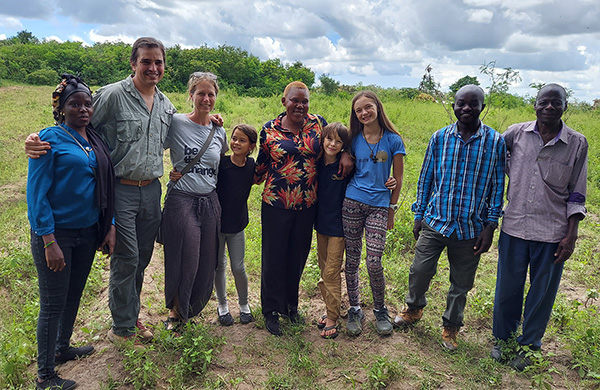
The Johnson family with friends
We adopted a guard dog for our property (which we immediately managed to Americanize and turn into a pet, much to the local Tanzanians’ great amusement and confusion), met a lot of people, and more or less learned how much more we have to learn.
All this took a surprising amount of time and energy. I often found myself collapsing into bed by 9 p.m., completely exhausted, and feeling like I’d accomplished exactly nothing that day.
And this is why Maryknoll Lay Missioners asks for what seems like a very long three-and-a-half-year commitment to mission. Maryknoll Lay Missioners does mission a bit differently than many organizations — for several reasons.
The first of these is that we are not here to “share the good news” or “proselytize.” And thank goodness for that, because in the short three months we have spent in Tanzania, it is very apparent that the Muslims, Hindus and Christians here live more deeply rooted in their faith than anywhere else I have lived. If it’s my faith I came to share, I would be severely lacking when measured up against almost anyone here.
Secondly, Maryknoll does not usually drop missioners into preassigned “jobs.” Honestly, some days I wish they did. It would be easier in many ways: “Here, go be a nurse at a clinic.” Instead, we are asked to accompany those around us: the poor, the suffering, the marginalized. We are asked to walk with them, be with them, and hear them. Maryknoll believes it is only from that place — that place of “being with” — that we can truly begin our work as missioners and begin to meet the needs that are most pressing at that moment.
But this is where it can get overwhelming. Because the needs are literally everywhere: Not enough to eat. No clean water. No consistent healthcare. Children without shoes. Infant orphans without formula. No jobs. Continued stigma around HIV/AIDS. Who am I fooling that I can do anything about any of these things?
The sheer magnitude of unmet needs can feel debilitating and so overwhelming that I want to pack my bags and go back home. It’s too hard; I don’t know how to hold all this; I have nothing to offer Tanzania; I shouldn’t even be here. That’s part of the reality of mission for me on many days: self-doubt and uncertainty.
Another missioner posted a meme on Facebook the other day that hit me at a deep soul level: “Sometimes the fear doesn’t go away — and you’ll have to do it afraid.”
This month I’m beginning work at Huruma School (huruma means compassion in Swahili), a school that was started by Maryknoll lay missioner Bertha Haas back in 2004. It started when she saw several local children with disabilities in her neighborhood that did not get to go to school. Being an educator prior to becoming a missioner, she decided to start offering classes for these children. Soon her classes grew from several students to 10 and then to 20. Currently there are over 60 students at Huruma School.
I often find myself feeling fear these days. The principal and staff look at me as if I’m a doctor. I’m not, I’m a medical-surgical nurse who has worked mainly with older persons in American hospitals. I know nothing about cerebral palsy, muscular dystrophy, deafness, Down syndrome or autism in children.
And yet there is a great need. Most of these children do not have regular (if any) access to medical care. I’m afraid that I don’t have the answers. That I’m not who they really need (“Is there a doctor in the house?!”). That I’m going to fail, that I won’t be enough.
I look to former missioners — like Bertha and the many other Maryknollers who have walked this path before me — for inspiration. Many of them were sent abroad not knowing what their mission would look like. I’m sure many of them felt fear. But I also know that many of them opened hospitals and schools and tended to those in great need — afraid.
So, what are we doing here? Most days I’m not able to answer that question. Perhaps in three and a half years, I’ll be able to look back and give a definitive answer. For now, though, I am trusting the process that Maryknoll has been following for the past 100-plus years: accompany and be with those on the margins. And yes, I do rely on my (often wavering and sometimes unsteady) faith to carry me through the days when I feel the fear more deeply.
In the ancient, almost 3,000-year-old words of the prophet Isaiah, God reminds me: “Fear not, for I am with you; be not dismayed, for I am your God; I will strengthen you, I will help you, I will uphold you with my righteous right hand” (Isaiah 41:10). A promise.
But then, more recently, the 2,000-year-old ask (yes, Jesus did have an ask of us): “Go out – and love one another” (John 15:12).
Whether back home in the Northwest with my neighbors and at the hospital with my patients, or now abroad in Tanzania with a bunch of kids I know medically very little about, that is the ask. For all of us. Love one another — one day, one person at a time.

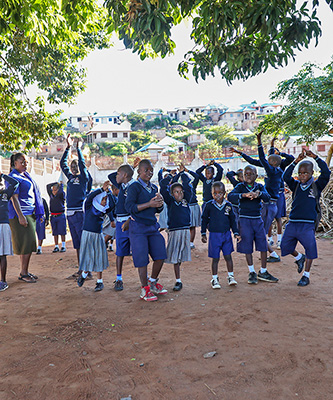

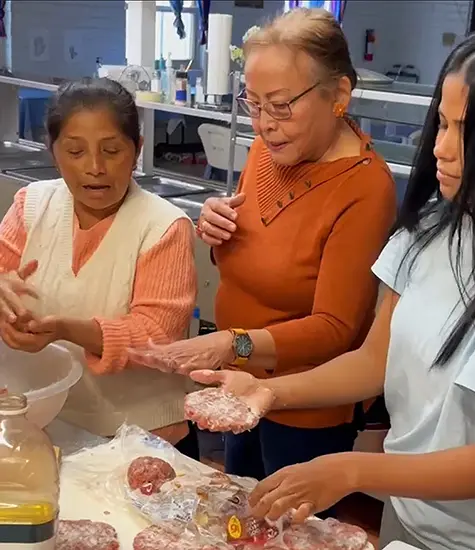

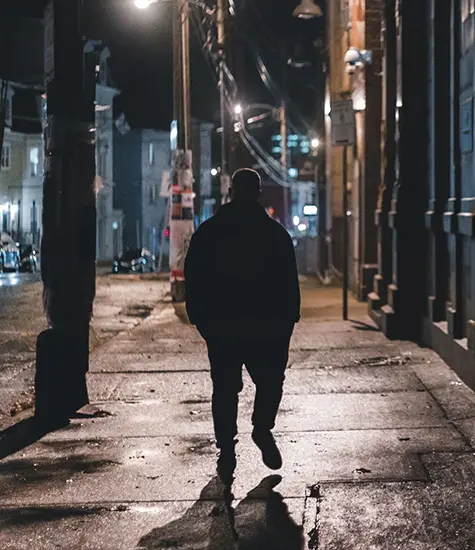




Thank you so much, Ana, for sharing. Know you’re not alone on this journey. I love how you describe your growth into accompaniment and how this has impacted your mission. “Go out and love one another.” Beautiful! Hang in there!